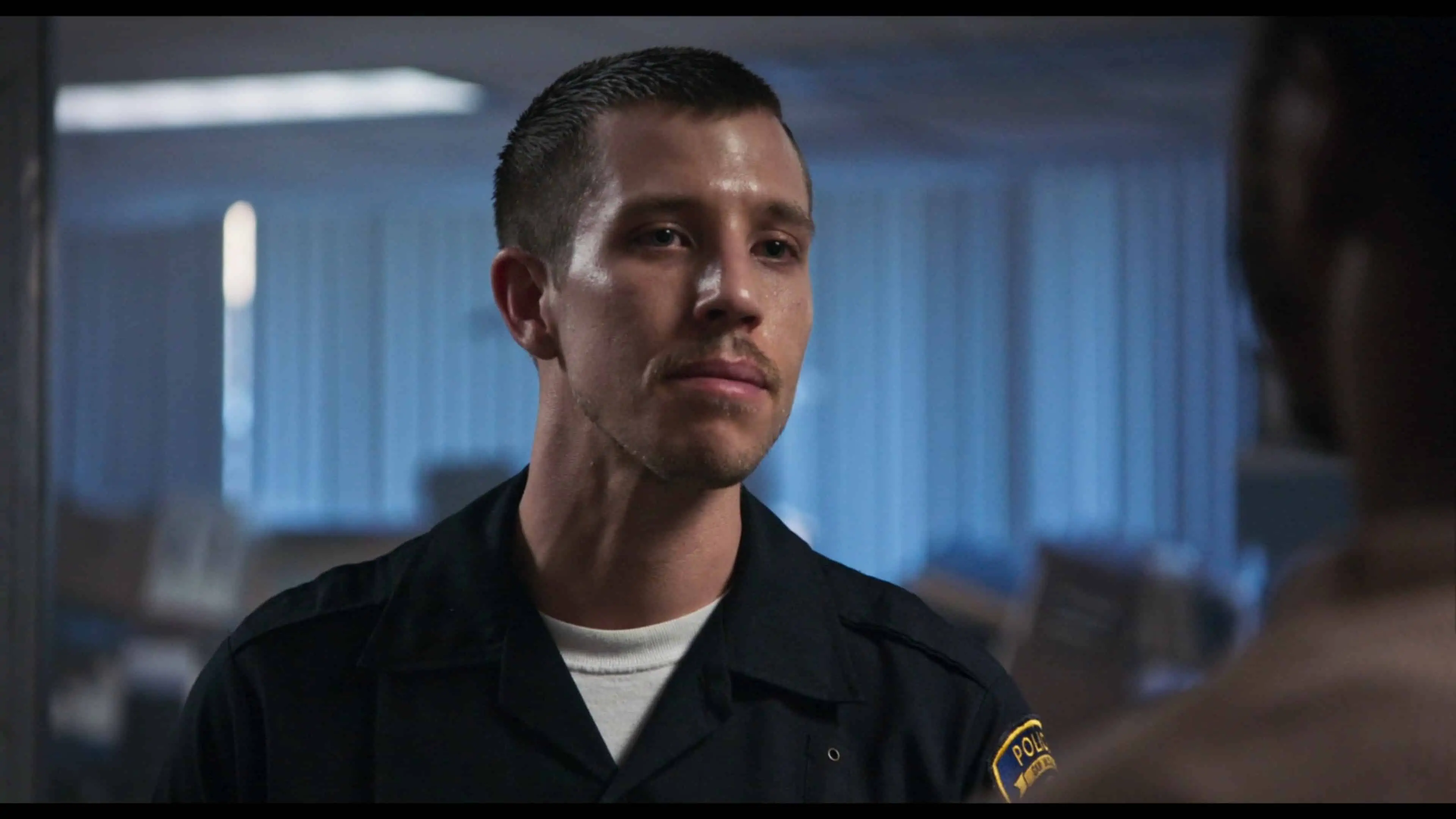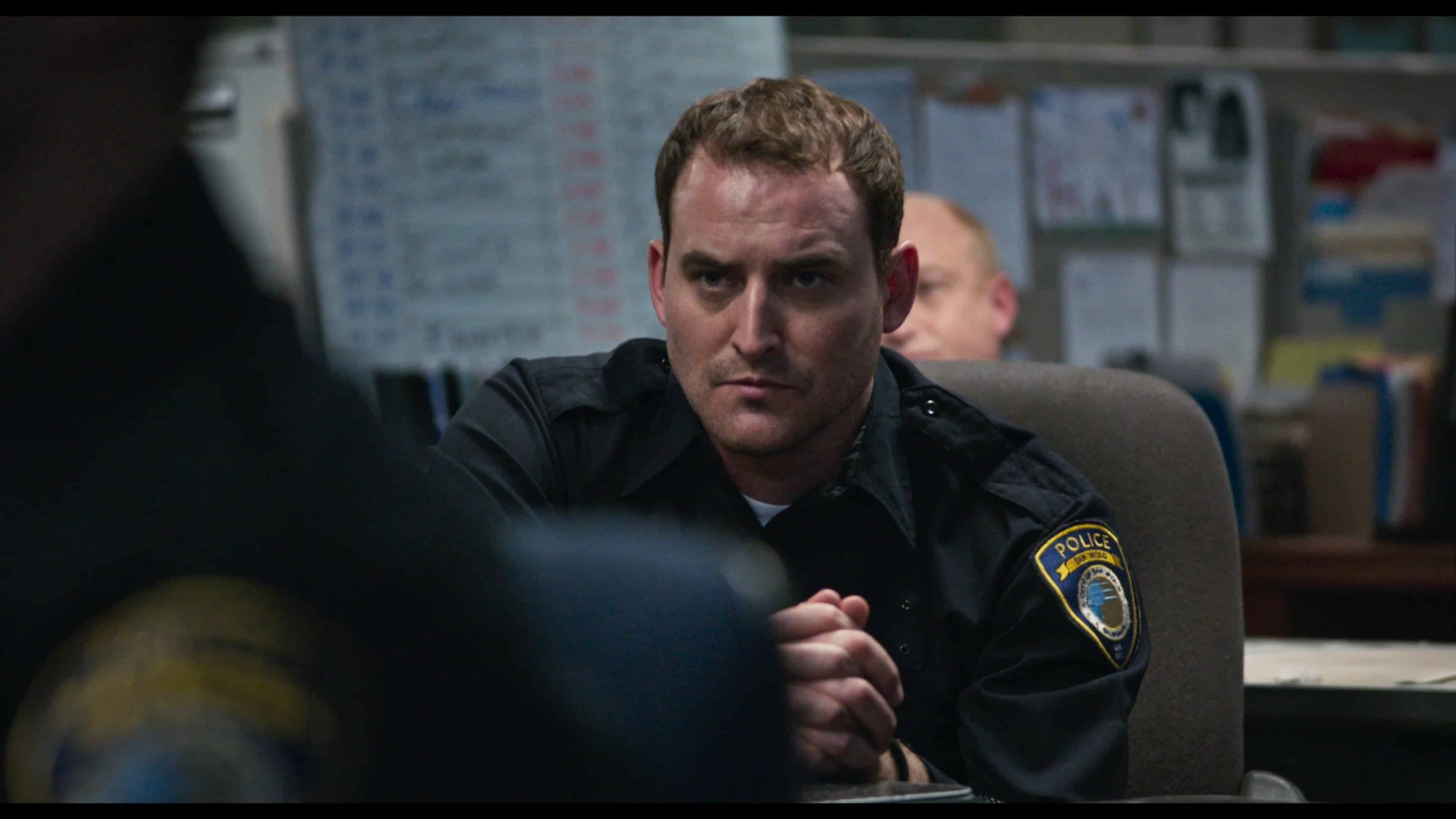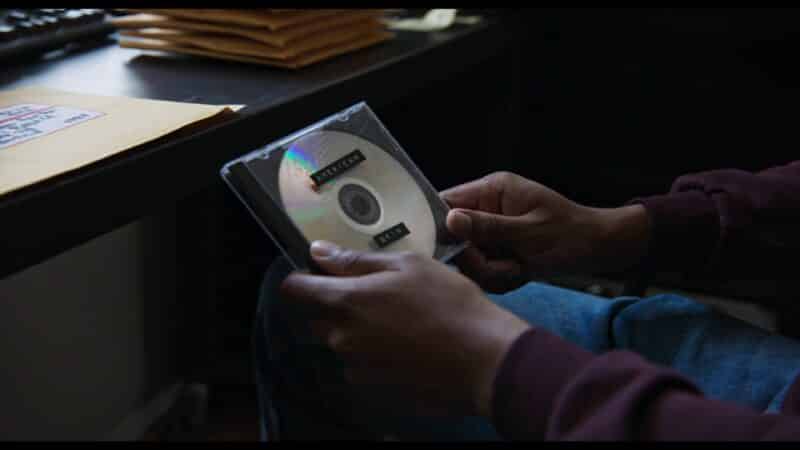American Skin – Review/Summary (with Spoilers)
American Skin is a confrontational film. One which confronts your views of police, their victims, and the perspectives the police bring based in fear and a righteous sense of duty.
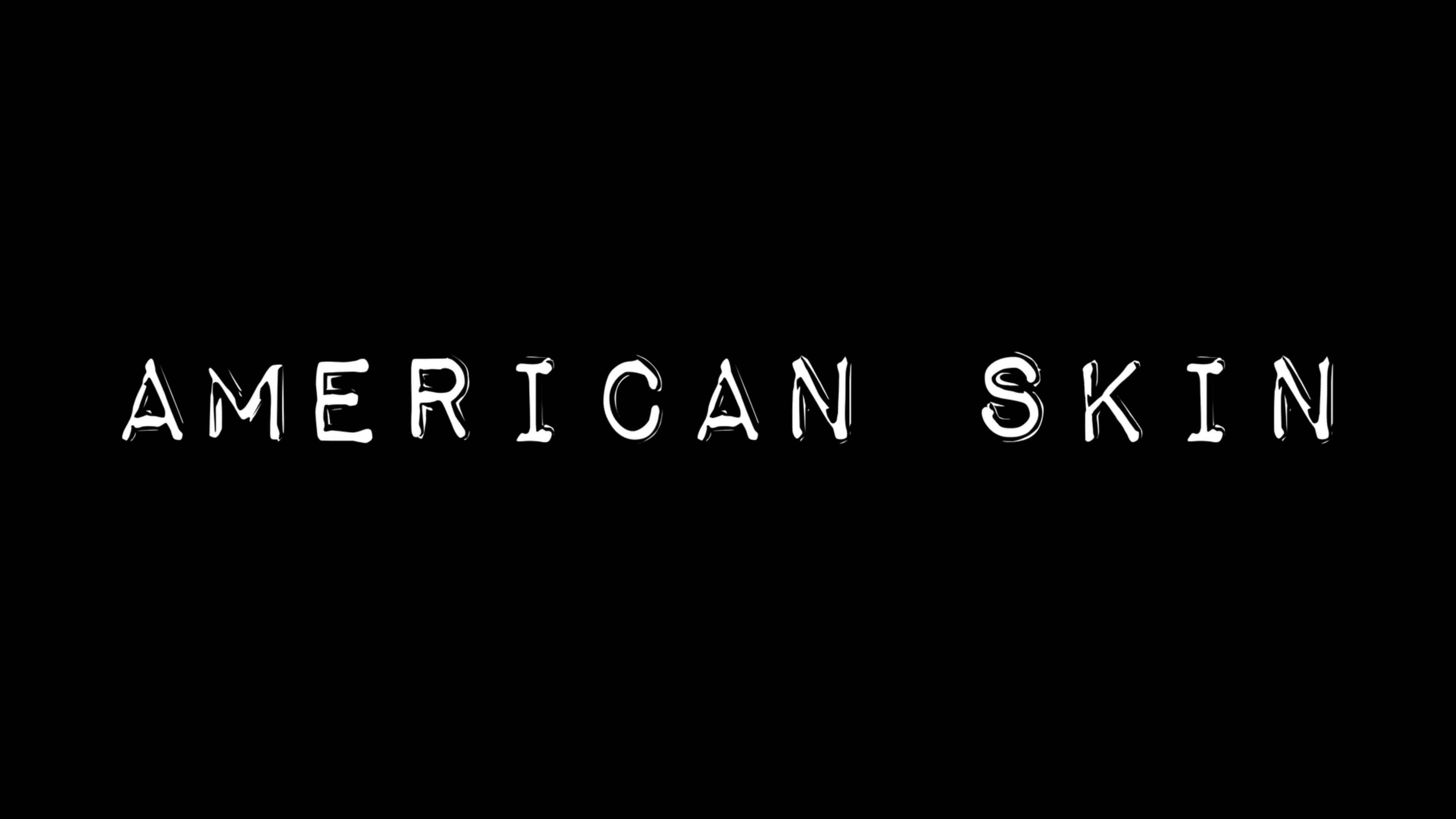
Spoiler Alert: This summary and review contains spoilers.
Additionally, some images and text may include affiliate links, meaning we may earn a commission or receive products if you make a purchase.
American Skin is a confrontational film. One which confronts your views of police, their victims, and the perspectives the police bring based in fear and a righteous sense of duty.
| Director(s) | Nate Parker |
| Screenplay By | Nate Parker |
| Date Released (Digital) | 1/15/2021 |
| Genre(s) | Action, Crime, Drama, Thriller |
| Duration | 1 Hour, 29 Minutes |
| Rating | Rated R |
| Noted Cast | |
| Lincoln “Linc” | Nate Parker |
| Kijani “KJ” | Tony Espinosa |
| Officer Randall | Beau Knapp |
| Officer Hollander | Ryan Mulkay |
| Jordin | Shane Paul McGhie |
| Captain Morris | Wolfgang Bodison |
| Sergeant Reyes | Theo Russi |
This content contains pertinent spoilers. Also, images and text may contain affiliate links, which, if a purchase is made, we’ll earn money or products from the company.
Film Summary
On July 3rd, 2017, Lincoln Jefferson was pulled over after picking up his son, Kijani “KJ” Jefferson, from a friend’s house. His car was pulled over, for allegedly speeding, by Officer Randall and Hollander, and due to issuing an expired insurance card, Lincoln, nickname Linc, was asked to step out of the vehicle as the situation began to escalate. His dad being asked to leave the car led to 14-year-old Kijani to wanting to tape the situation and Officer Randall deciding to pull his gun, for he felt threatened. Kijani wasn’t quick to comply with getting out of the car or putting his phone away, so Kijani was shot – multiple times.
Building up to the date of Officer Randall’s trial, a young man named Jordin decides to do a documentary on the case and is with Linc and his family when Officer Randall doesn’t face charges. Thus leading to Linc, an ex-marine, gathering some friends and forcing Jordin and his film crew, on November 10th, 2018, to join him as they take over the San Vasillo police department.
Why? No, not to kill cops and make a bad situation worse. Instead, all Linc wants is justice. So, using some of the police station’s non-violent prisoners and staff, he holds a trial. An unconventional trial in which anyone can speak, including the cops, to get to the bottom of what happened and why the killing of children like Kijani, and even Black men like Linc, continues to happen.
Things To Note | Question(s) Left Unanswered
- Reason(s) for Film Rating: Gun violence, drinking, blood, and cursing
- Jump Scares/ Laughs/ Tear-Jerking Moments: When Kijani gets shot, you may have the same reaction as when you watch a jump scare. Also, in certain moments of frustration, you could find yourself crying because you know Parker’s words ring true, and there isn’t likely anything that will change things.
- Availability: Get on Amazon
Collected Quote(s) & .Gifs
[…] those laws weren’t written with us in mind and anyone that tells you differently, is either white or just lucky they haven’t had to put it to the test yet.
— Linc
I know how things in the past affect things happening now.
— Officer
[…] that’s America, right? We don’t fix the system; we just put a premium on the way to get around it.
— Linc
Great nations aren’t great because they oppress, but because they liberate. Not because they kill, but because they heal.
— Jordin
Cast & Characters
Lincoln “Linc”
Lincoln is an ex-marine who struggled after coming home due to not being able to find employment. However, after finding a job as a custodian at the private school, Tovar Academy, he changes his and Kijani’s life around. Kijani was now learning civics, rather than how to spot when a fight would break out. And things were so good that Kijani lived with Lincoln, and Lincoln got to help show Kijani what it was like to be a man, a Black man.
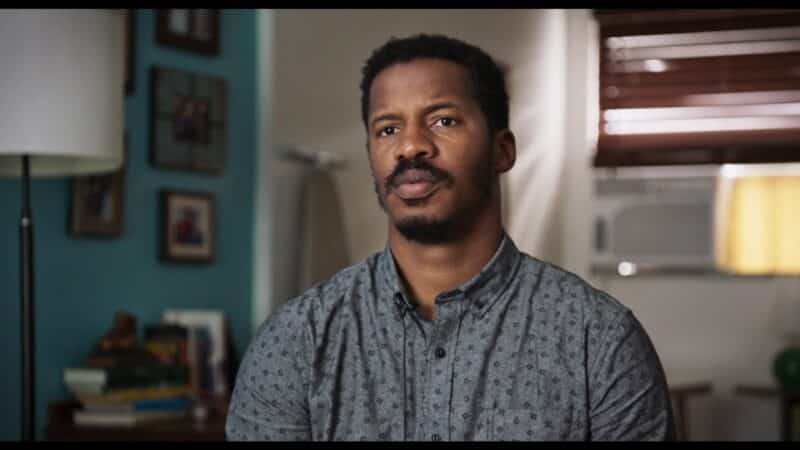
However, a person can only do but so much to protect their child.
Kijani “KJ”
For a good part of his life, since his dad was doing two tours in Iraq and struggled when he got back, Kijani lived with his mom and went to a local school. A place that, as soon as Lincoln got the chance, he got him out of but with the change of scenery seemed to come the need to remind Kijani he was Black. Such a lesson Kijani didn’t seem to understand in theory, so, as his father said above, it was put to the test and cost Kijani his life.
Officer Randall
The cop who killed Kijani.
Officer Hollander
The cop who pulled over Lincoln since he and Officer Randall found him suspicious.
Jordin
Jordin is a college student who makes a documentary originally about Lincoln and the killing of his son but gets dragged into Lincoln’s hostage situation so he can film the whole truth and how they got there.
Captain Morris
The captain of the precinct who was originally called on to bring peace to the city through using Kijani’s mother. However, with Lincoln not wanting to turn the other cheek, accept what happened, and move on, he is used to get the hostage situation going and also treated as a scapegoat as race comes into play when it comes to the officers’ decisions.
Sergeant Reyes
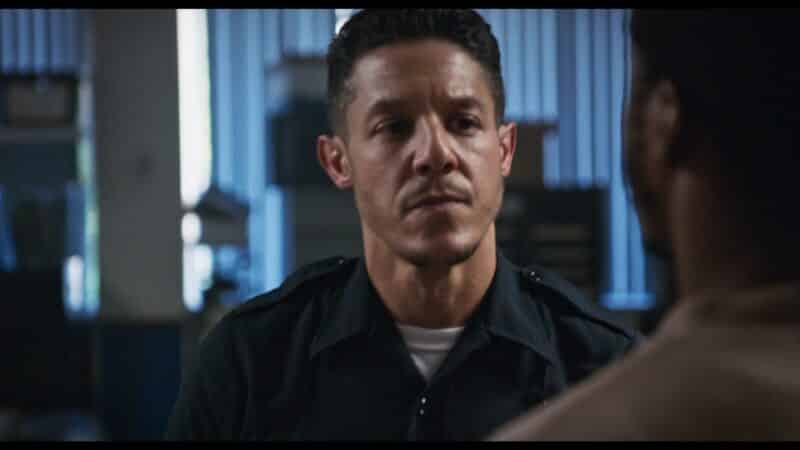
One of the most vocal members of Officer Randall’s trial held by Lincoln, that vehemently defends him and the work of police officers, while addressing his disdain for how members of his race/ culture, who aren’t on the up and up, hinder his, and his people’s, progress.
Review
Highlights
The Conversations During Officer Randall’s Trial
Despite how embedded you can become in Linc’s feelings and point of view, there is still breathing room given to the cops. Some of the arguments and opinions are ignorant, like Officer Hollander talking about him not seeing color and how his team cannot be racist considering Captain Morris is Black. You know, that old bulls***. Yet, then comes Sergeant Reyes and Officer Randall’s opinions.
With Sergeant Reyes being Hispanic or Latinx, you can see this conflict. There is hating that he is pooled with the less desirables in his community, which potentially hold him back, alongside wanting to protect the blue wall. Yet, there is also the argument of how Black people should get over slavery, but when it comes to Jewish people with the Holocaust and women over the multiple justices they’ve been through, that’s different.
And at times, you may feel so many arguments and defenses going back and forth that it all becomes jarring. Mainly due to most being ready to defend their opinion more often than listen to others. Yet, this isn’t to say points aren’t made for both sides. To wrap up the cop side of things, Officer Randall repeatedly mentions their training, which doesn’t include de-escalation, that doesn’t push them to not operate in fear, and rather use that paranoia and prejudice for they might just find a bad guy. Which is what everyone wants from cops, right? Find the bad guys, protect our neighborhood, even if it means your life.
Yet, on the flip side, there is the question of what’s so threatening about a 14-year-old? What about a phone made you so scared you had to shoot him multiple times? Would it have been so wrong to let Linc check his glove box for a new insurance card? Hell, it even goes deeper than that during Officer Randall’s trial at the police precinct.
Take note of Officer Randall being mad he doesn’t have any peers on the jury, and Lincoln reminding him that is how his people often feel. Also, Linc getting pulled over for having a car, which isn’t nice, in a nice neighborhood. Hell, bringing Officer Hollander back in, making the argument that an education is one way to make things better when it is due to getting an education, making friends in a nice area, that led to Kijani getting killed. Because both Linc and Officer Hollander both wanted their kids to go to better schools, knowing private schools prep you for college and public schools the bare minimum, one has two alive daughters and the other a dead son.
Truly, to document every back and forth would damn near require putting the script up verbatim. But believe me, when I say for everything said by one side or the other, there is an explanation. However, after a certain point, what we see from the cops are excuses to sidestep accountability. Meanwhile, the makeshift jury and Lincoln push back on the idea that a dangerous job should mean qualified immunity for all situations. Because, if you are so scared for your life, so comes the question of why do you continue the job?
While It Starts Slow, Once It Picks Up It Is Zooming
When American Skin begins, the focus is giving you the background of Jordin, Linc, KJ, and what happened. That is about a little less than the first half-hour of the movie, and honestly, watching this at home made me want to take a break. However, once it became clear what Linc was going to do, things pick up, and as Linc and others have biting criticism over how things were handled when it came to KJ and how the police act in general, American Skin is a speeding train.
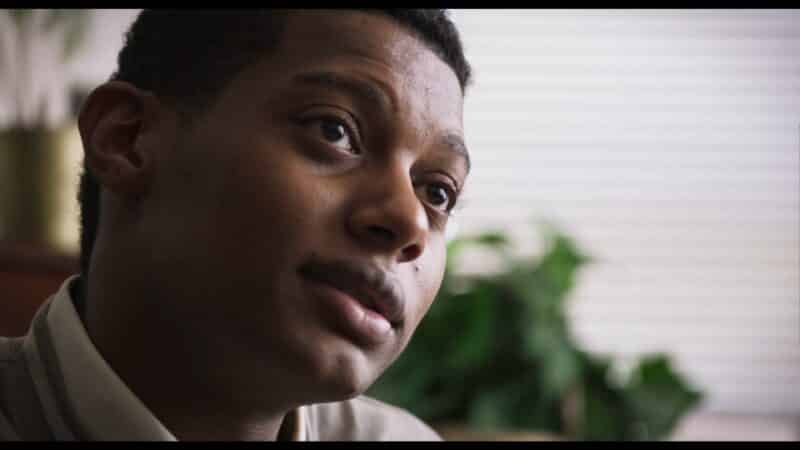
For as you come to understand Linc’s argument of hating the fact Black people are always expected to react peacefully, turn the other cheek no matter how many times slapped, and no matter what hits them, his energy is your energy. Parker’s anger as Linc is your anger, and it makes it so you wanna clap when someone reminds a cop they are ignorant or full of it, and when Officer Randall stands trial, you make your peace with how you figure things will end for him, and ultimately Lincoln.
The Mind-F*** Of Being A Black Kid Going To A White School
Personalizing our feelings about American Skin and Kijani’s situation, it can be easy to forget that within the same state, maybe less than an hour away, two kids can live in two different worlds. As a personal example, I grew up in various parts of Newark, NJ, but also spent a year or two in Westfield, NJ. In Newark, for multiple semesters, two of my classes were taught by substitutes who took attendance, and that’s it – there was no instruction. In my history class, things were split between those who wanted to learn towards the front and the rest in the back of the class, goofing off, for they were given up on.
This is in comparison to Westfield, where, when it came to kids like me, who were a grade or two behind in subjects like math, they scooped us out, assigned us a teacher and room, and caught us up to be put back with our peers. But while everything regarding education was ace, in terms of cultural awareness, not so much. When you go from the majority, where everyone is some shade of Black or Brown, and you are reminded that when teachers talk to you, to race/culture not being a thing, you see the difference.
After all, what reason would white teachers and students have to talk about race or other cultures? It isn’t something they are forced to deal with, it is optional. There weren’t even Black authors in Westfield, never mind other people of color, used in our English classes. They’d rather reach across the ocean and have us read Agatha Christie before Maya Angelou, James Baldwin, or anyone who brought the mainly white student body and staff some sense of what goes on outside the bubble they created and maintained.
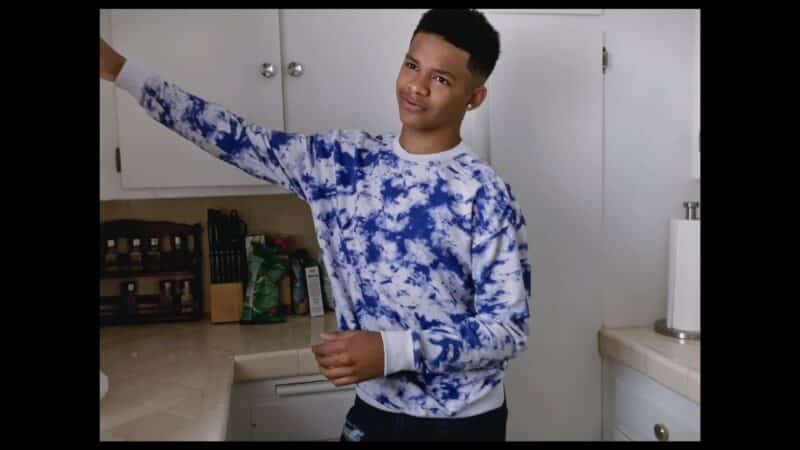
So when it comes to Kijani, early in the film, you see him talk about how cops can’t treat people and how you have the right to resist if they are unlawfully detaining you and Linc has to check him. That conversation is key to understanding why Kijani died.
For if you are raised in an area where your culture’s history is treated as a footnote, something to glaze over, while the Holocaust, women’s suffrage, are treated as things we must not forget, but slavery and the aftermath as something to move on from, this is what happens. When the Civil Rights movement is treated as something which healed America’s racial indifference, rather than just led to legislation sourced in guilt due to people publicly bloodied and killed, and are issues that remain systemic, this is what happens. You downplay the realities of your situation, forget yourself, and end up in harm’s way. You forget the bubble you live in does not represent the outside world and all its complexities. Nevermind most will refuse to see you as a complex individual but rather generalize you until you prove yourself an exception.
On The Fence
The Ending, While Truthful Leaves You Wanting To Punch Something
With that said, the ending is realistic but infuriating. But more on that below.
Overall
Rating: Positive (Worth Seeing) – Recommended
American Skin acts as a reminder that the United States of America should be happy and lucky that it is only the far right that acts out and gets violent due to feeling mistreated. For whether we’re talking about women, Black people, or other people of color, many have understandable reasons to hate the system and who it ultimately protects. Because it was never made to protect them and while laws were made out of guilt, usually due to watching people suffer and die, those laws are either not universally enforced or have no protections from being modified or weakened. Thus, they are barely worth the paper they are written on.
Hence the positive label and recommendation. American Skin works in two major ways: It can be seen as a cathartic release for those who want honesty and justice, yet also operate as a warning. If this country wants unity and to not become more fractured and fragile, there has to be a reconciliation with the truth of American history. Otherwise, as long as everyone is operating on different understandings, there will be no unity. Because being fearful of tarnishing the false narrative of what it means to be an American, or what America was built on and why it excels, will only lead to the continued problems which brought down other nations.
[amazon bestseller=”American Skin” items=”3″]
[ninja_tables id=”46802″]
American Skin Ending (Spoilers)
After the back and forth between Lincoln, Officer Randall, members of the jury, and Officer Randall’s peers is over, Officer Randall is found guilty. With this in mind, it seems Linc planned to execute him, but that wasn’t the plan. All Lincoln wanted was an admittance that what Officer Randall did was wrong, what cops do often can be wrong, and for them to not just move on like a child wasn’t just murdered. There had to be consequences, and putting the fear of god into Officer Randall was enough.
Heck, Officer Randall even seemed like he changed. However, while he may have changed the system did not, and even with Officer Randall peacefully escorting Linc out, who was ready to serve a prison sentence for what he did, he was swiftly shot fatally. Leading to every news report making him seem crazy, like a terrorist, and not at all addressing the real reason for why he did what he did.
Making it so Jordin, the holder of the documentary he called “American Skin,” holding the truth and sending it out to festivals, amongst other entities, in hopes of getting the truth beyond the media’s narrative.
Does American Skin Have Prequel/ Sequel Potential?
You could submit a sequel could be done where we see Jordin shop and talk about what happened. Continue the conversation about excessive use of force, how the paranoia of getting hurt shouldn’t shield cops and give them a license to kill. Especially considering their training isn’t to de-escalate and you, as a citizen, have no real means to defend yourself – particularly if you aren’t white. Because, as much as the conversations in the film touch on a little bit of everything, it doesn’t mean there aren’t more to be had.
Images used for editorial and commentary purposes. All rights remain with their respective copyright holders.

